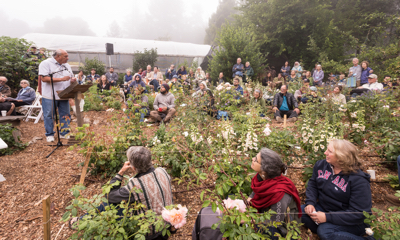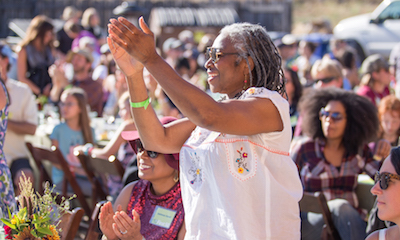A half century of pioneering work in organic farming was evident this past weekend as hundreds of farmers, educators, scientists, and alumni gathered to celebrate the 50th anniversary of the Alan Chadwick Garden—and all that has followed.
The three-day celebration culminated with a joyful dinner presided over by famed chef, restaurateur, and organic food advocate Alice Waters.
“I wonder if you know how many businesses like mine buy food from people who are taking care of the land who were educated here at Santa Cruz,” Waters told a crowd of 500 people gathered at long tables outside the historic Hay Barn as they dined on organic fare. “This all comes from Alan Chadwick.”
The founder of the garden that today bears his name, Chadwick was a master gardener who introduced organic farming and gardening techniques to the campus and sparked a movement that would spread those principles far and wide—decades before anyone coined the phrase "sustainable agriculture."
Jim Nelson of Camp Joy Gardens in the San Lorenzo Valley said Chadwick influenced his decision to become an organic farmer and prompted him to turn his farm into a classroom. Nelson met Chadwick in 1967, just as the back-to-the-land movement was brewing.
“Last night, we were all talking about various aspects of Alan’s personality, which was big,” Nelson said, laughing. “The thing that really sticks out was his generosity.” Chadwick had the patience and generosity that are staples of all great educators, said Nelson.
The weekend featured a full slate of events, including tours of the Farm & Garden, community workshops, a symposium featuring graduates of the Apprenticeship in Ecological Horticulture, and reunions for Nelson and others who studied under Chadwick and his successors.
One of the hallmarks of what is now the Center for Agroecology and Sustainable Food Systems (CASFS), the apprenticeship is a rigorous six-month residential program that immerses participants in hands-on farming and gardening techniques, as well as the scientific underpinnings of sustainable farming. Over the years, the focus has broadened to include social justice issues, such as fair wages and safe working conditions for those involved in food production.
The 30-acre Farm produces about $165,000 worth of organic produce annually. Apprentices and undergraduate interns tend rows of kale, lettuce, tomatoes, and other row crops, as well as orchards full of apples, pears, plums, apricots, and more.
“The most important crop we produce every year is the people who come through here,” said Christof Bernau, a former apprentice and current Farm Garden Manager.
As the organic movement and the principles of biodynamic farming have moved into the mainstream, more universities have established working farms.
"You know you’re good when people start copying what you do," UC Santa Cruz Chancellor George Blumenthal told the dinner crowd.
"What’s taken root is amazing," he said. "1,500 apprentices: Think about how many lives have been touched by this facility. We were first—and 50 years later we are the global leader in the sustainable food movement."
Today, the Farm & Garden also serve as outdoor laboratories for faculty and staff researchers focused on soil science, plant varietals, pollinators, innovative farming techniques, organic pest control, and other aspects of agroecology.
Darryl Wong, farm site and research lands manager for CASFS, touched on some of the research being conducted: a no-till trial on the Farm aimed at increasing carbon sequestration; the use of hedgerows to manage pests; and strategies to help organic strawberry growers and nurseries on the Central Coast.
CASFS is also spearheading efforts to provide fresh, local, organic produce to UC Santa Cruz students through the Food Systems Working Group (FSWG).
“Some of my friends live off noodles, and I know one student who started a GoFundMe (campaign) so he could buy food,” said Carlos Lemos, a fourth-year student and co-chair of FSWG.
Tim Galarneau, the community-engaged education coordinator for CASFS, encourages undergraduates to take a lead role in distributing organic produce to students who may be experiencing food insecurity. Lemos and others stock the campus food pantry full of fresh, Farm- and Garden-grown produce, host pop-up produce stands on campus, and advocate for more healthy, locally grown food in the dining halls.
“People think we are just managing the Farm, but we are very intersectional with issues of equity and justice,” said Galarneau.
Many of the former apprentices who returned for the 50th anniversary welcomed the broader focus.
“The social-justice aspect of this program wasn’t really here when I attended,” said Kristina Scott, a 2003 apprentice with CASFS. “It’s really good to see that conversation got started.”
Blumenthal echoed that theme during his remarks at dinner: “It’s really an absolute pleasure to be a part of the 50 year celebration of this place,” he said. “It represents so much of what UC Santa Cruz is about—environmental stewardship, sustainability, and social justice.”











